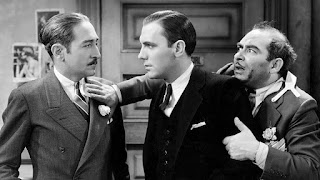Best Pictures #42:
1930-31 (4th) Academy Awards Outstanding Production Nominee
The Front Page (1931)
You shouldn’t judge a remake by its earlier version. That
would be ideal, but it’s hard to be ideal. Likewise, you shouldn’t judge a
movie by its much more notable remake. In this case the remake is His Girl Friday, one of the prime
examples of screwball comedy. Surprisingly, I didn’t think about His Girl Friday as much as I was afraid
I would while watching The Front Page.
Based on the play by Ben Hecht and Charles MacArthur, The Front Page was produced
independently by Howard Hughes and released though United Artists. It was
directed by Lewis Milestone, who had just won the Best Director award at
the previous year’s Academy Awards. Milestone already had two Oscar wins for
Best Director under his belt, for Two
Arabian Knights (1927) and All Quiet
on the Western Front (1930), and picked up a nomination for his work on The Front Page. The last film I saw
directed by Lewis Milestone that was based on a play was, The Racket (1928), an Outstanding Picture nominee at the 1st
Academy Awards. I did not care for the results, especially the staging of
dialogue heavy scenes and bland visual style. That film was silent so the
scenes of men dressed similarly talking to each other in rooms were a bit hard
to follow. The reporters in The Front
Page dress mostly the same, however, since this is a talkie, each actor’s voice helps to distinguish them in the many scenes in which the
reporters are gathered together. Milestone and his cinematographer, Glen
MacWilliams, are able to give visual flair to very verbal material. Visually interesting
shots and camera movements are plentiful. The most interesting and
oddest visual moment happens when the gang of reporters, gathered around a
table in the press room, mock the Sheriff by singing at him derisively. Instead
of just panning around the room to each reporter, the camera tilts quickly up
and back down from one reporter to the next.
The Front Page is
a film that could not have been made just a few years before in the silent era. The
fast paced dialogue and sharp, wry sense of humor are what make the movie. This
material needs the technology of sound; a silent version of this movie would be
rather dull. Though the stars of this movie are Adolphe Menjou as Burns and Pat
O’Brien as Hildy, we spend a great deal of the film—the entire second act—with
the gaggle of character actors as fellow reporters cramped together in the
courthouse pressroom. The standout of that bunch is Edward Everett Horton with
his very distinctive voice. All of the characters, including the two main
characters, were based on real courthouse correspondents that Hecht and MacArthur
spent time with while researching their play. The reporters are crass and
acerbic about their jobs and subjects. Their utter contempt for anyone involved
in the running of the city (especially the sheriff and the mayor) feels
completely genuine. One character even gives the mayor the finger—this is a
Pre-Code film after all.
The big story all these reporters are trying to get a scoop
on is the imminent hanging of a convicted murderer and anarchist named
Williams. Everyone calls him a Bolhevik, though he is actually an anarchist but no
one listens or cares when he explains the difference. Walter Burns, the editor
of the Post connives to keep his star reporter, Hildy Johnson, in town and on
the story. All Hildy wants to do is get married and leave town, but he can’t
pass up a good story, and the story gets even better when Williams escapes. As for
the movie, despite the quick paced dialogue and acerbic humor, it feels like it
is treading water whenever Menjou is offscreen. The reporters are literally
sitting around biding time until execution and though they provide humor and
social commentary (they accuse the mayor and the sheriff of moving up the
execution to just before election day to nab votes), they are too undeveloped for how
much time we spend with them. Menjou surprisingly has only a few scenes and is
largely absent until he returns for the final act and dominates the film. The
pace picks up significantly when Menjou is present. It’s no surprise that he
received a nomination for Best Actor. Edward Everett Horton is eccentric and
funny in his role, and Mae Clark gives a solid performance in the small role of
Williams’s girlfriend.
With its limited sets and distinct acts, The Front Page feels undeniably of the
theater, but director Milestone finds ways—some subtle, others less so—to keep
the eye engaged while the fast, funny dialogue entertains the ear. This is an
uneven film that perhaps could have benefitted from trimming some scenes but it
manages to end strong thanks to Menjou. This is the beginning of what would
grow into screwball comedy and would be an interesting film for fans of the
genre to watch. The DVD print is readily available, but is not of the best
quality. The audio track is mostly good but visual irregularities are present. The Front Page was selected for
preservation in the National Film Registry by the Library of Congress in 2010.
I’m not a big fan of this movie, but I’m glad to know it is preserved and
available.
Nominee: Caddo, U.A.
Producer: Howard Hughes, Lewis Milestone
Director: Lewis Milestone
Screenplay: adaptation by Bartlett Cormack, additional
dialogue by Charles Lederer, based on the play by Ben Hecht and Charles
MacArthur
Cast: Adolphe Menjou, Pat O’Brien, Mary Brian, Edward
Everett Horton
Release Date: April 4th, 1931
Total Nominations: 3, including Outstanding Production
Wins: N/A
Other Nominations: Actor-Adolphe Menjou, Director-Lewis
Milestone





No comments:
Post a Comment